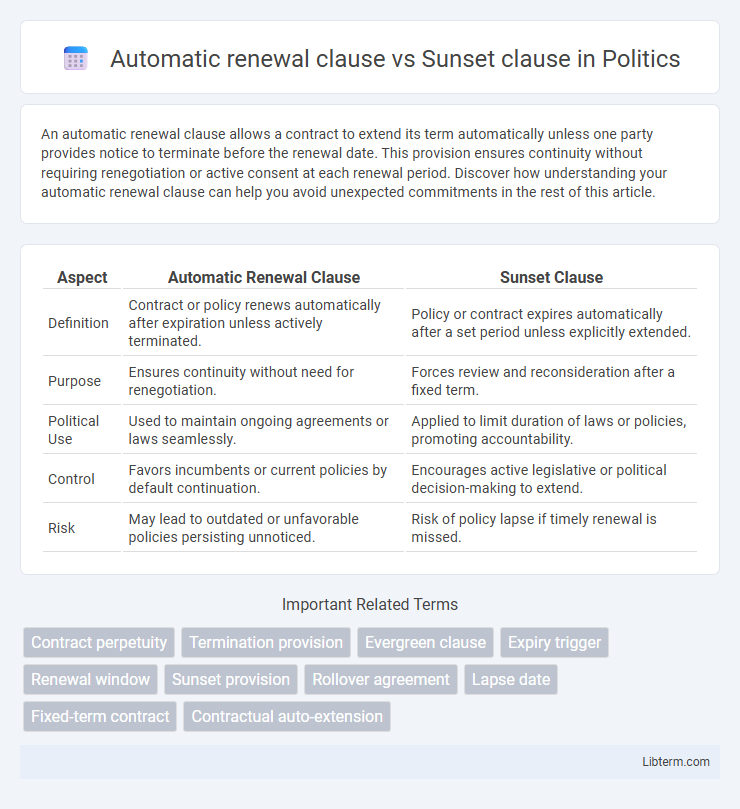An automatic renewal clause allows a contract to extend its term automatically unless one party provides notice to terminate before the renewal date. This provision ensures continuity without requiring renegotiation or active consent at each renewal period. Discover how understanding your automatic renewal clause can help you avoid unexpected commitments in the rest of this article.
Table of Comparison
| Aspect | Automatic Renewal Clause | Sunset Clause |
|---|---|---|
| Definition | Contract or policy renews automatically after expiration unless actively terminated. | Policy or contract expires automatically after a set period unless explicitly extended. |
| Purpose | Ensures continuity without need for renegotiation. | Forces review and reconsideration after a fixed term. |
| Political Use | Used to maintain ongoing agreements or laws seamlessly. | Applied to limit duration of laws or policies, promoting accountability. |
| Control | Favors incumbents or current policies by default continuation. | Encourages active legislative or political decision-making to extend. |
| Risk | May lead to outdated or unfavorable policies persisting unnoticed. | Risk of policy lapse if timely renewal is missed. |
Introduction to Contractual Clauses
Automatic renewal clauses ensure a contract extends beyond its initial term unless a party provides notice to terminate, promoting continuous service without renegotiation. Sunset clauses set a definitive expiration date for contract provisions or the entire agreement, requiring explicit renewal or renegotiation to continue. Understanding these clauses is critical for managing contract duration, minimizing unwanted extensions, and aligning agreements with strategic business timelines.
What is an Automatic Renewal Clause?
An Automatic Renewal Clause is a contract provision that extends the agreement for a specified period unless one party provides notice to terminate before the renewal date. This clause ensures continuity of service or subscription without the need for renegotiation, often found in leases, software subscriptions, and service contracts. Understanding the automatic renewal clause is crucial to avoid unintended contract extensions and potential financial commitments.
Key Features of Automatic Renewal Clauses
Automatic renewal clauses specify that a contract will renew for a set period unless one party provides notice of termination before the renewal date, ensuring continuity without renegotiation. These clauses typically include defined renewal terms, automatic extension periods, and specific notification timeframes to avoid unintentional contract lapses. Key features optimize contract management by reducing administrative burdens and maintaining ongoing service agreements efficiently.
Understanding Sunset Clauses
Sunset clauses specify the expiration date of a contract or specific provisions, ensuring they automatically terminate unless actively renewed or renegotiated, contrasting with automatic renewal clauses that extend agreements without explicit consent. Understanding sunset clauses is crucial in contract management as they provide built-in review points, preventing indefinite obligations and encouraging timely reassessment of terms. These clauses offer legal and financial clarity by defining precise endpoints, reducing the risk of unintended contract continuation.
Essential Elements of Sunset Clauses
Sunset clauses include specific time frames or conditions under which contractual obligations or laws automatically expire, ensuring clear termination points. Essential elements of sunset clauses include a defined expiration date, predetermined criteria for review or renewal, and explicit terms for enforcement cessation. In contrast, automatic renewal clauses renew contracts without renegotiation, unless proactive termination occurs, lacking the fixed end-point characteristic of sunset clauses.
Comparative Analysis: Automatic Renewal vs. Sunset Clauses
An automatic renewal clause extends a contract term by default unless one party opts out, ensuring continuity without renegotiation, while a sunset clause sets a fixed expiration date after which the contract automatically terminates unless expressly renewed. Automatic renewal clauses benefit ongoing service agreements by reducing administrative oversight, but may lead to unintended obligations if notice requirements are missed. Sunset clauses provide clear end dates that promote timely review and renegotiation, reducing the risk of perpetual contracts and fostering contract lifecycle management.
Legal Implications and Enforcement
Automatic renewal clauses legally bind parties to extend contracts unless explicit termination occurs, often resulting in continued obligations and potential financial liabilities. Sunset clauses impose a predefined expiration date, limiting contractual duration and reducing long-term risk by mandating renegotiation or termination upon expiration. Enforcement of automatic renewal clauses requires clear disclosure and consent under consumer protection laws, while sunset clauses generally face fewer disputes due to their fixed-end nature.
Practical Use Cases in Contracts
Automatic renewal clauses simplify contract management by extending agreements without renegotiation, commonly used in subscription services and software licenses to ensure uninterrupted access. Sunset clauses provide a definitive end date or condition for contract termination, frequently applied in joint ventures or government agreements to limit duration and enforce review. Businesses use automatic renewal to maintain continuous service while relying on sunset clauses to manage risk, control commitment length, and encourage periodic evaluation of contractual terms.
Risks and Benefits for Parties Involved
An automatic renewal clause offers continuity and convenience by extending contracts without renegotiation, reducing administrative burden, but may risk locking parties into unfavorable terms if market conditions change. A sunset clause provides a clear contract expiration, prompting timely review and renegotiation, which mitigates long-term risk and encourages adaptation but can introduce uncertainty and potential business disruption. Both clauses balance contract stability and flexibility, with automatic renewal favoring operational ease while sunset clauses prioritize strategic reassessment.
Tips for Drafting Effective Renewal and Sunset Clauses
When drafting effective automatic renewal and sunset clauses, ensure clarity in the duration and conditions of renewal to avoid unintended contract extensions. Specify precise notice periods and methods for termination to protect both parties' interests and reduce disputes. Incorporate measurable performance criteria in sunset clauses to allow objective assessment of contract continuation or termination.
Automatic renewal clause Infographic

 libterm.com
libterm.com